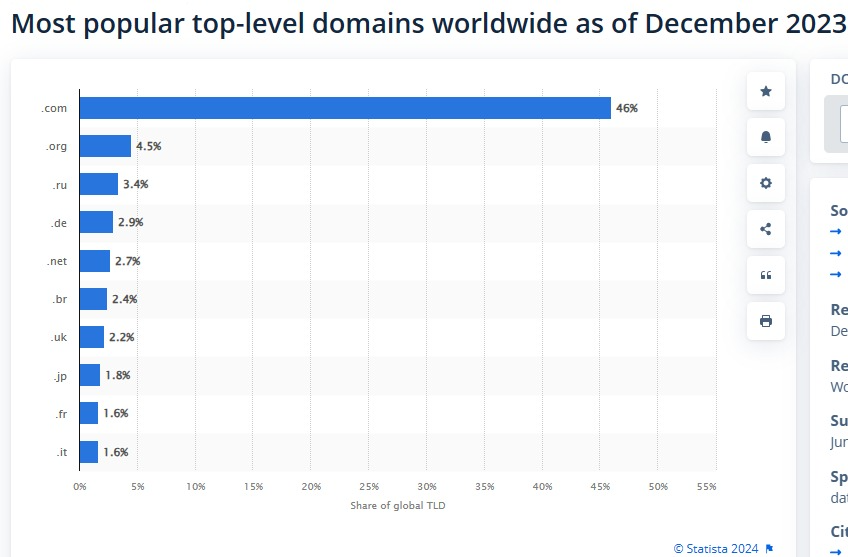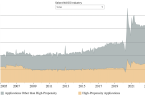
That’s actually an intriguing question.
I came across a topic on NamePros suggesting that new TLD’s are harder to sell than older, classic legacy TLD’s and it got me thinking. So, let’s dig into that topic a bit more and see if there is some legitimacy to it or if it’s mostly opinionated.
Variables to consider:
- Extension Popularity (Number Registered)
- Extension Sales History (Reported Sales for a Specific Extension)
- Extension Accreditation (ICANN Vs. Alternate-Root)
- Extension Age (Creation Date)
- Extension Niche (After the dot Generic or Country-Code Keyword or Geo interest)
- Pairing (How well before the Dot and after the Dot pair together)
The above should give us enough data to look at to speculate with some accuracy.
Note: This isn’t an evaluation for a specific domain name. It’s a general review of domain extensions to help determine if newer TLD’s are actually harder to resell than older classic legacy TLD’s.
Let’s dive right in!
Extension Popularity (Number Registered)

Note: The top 10 domain extensions are classic legacy gTLD’s and ccTLD’s. There are no newer gTLD’s in the top 10. While this paints a picture of what people are buying the most (Good to know), it doesn’t rule out newer gTLD’s from being able to be sold just as easily as older TLD’s.
Extension Sales History (Reported Sales for a Specific Extension)
Let’s compare 3 older gTLD’s, 3 ccTLD’s, and 5 random newer gTLD’s reported sales history.
- .org = 67,273 entries
- .net = 56,376 entries
- .info = 7,687 entries
- .us = 3,412 entries
- .ai = 9,143 entries
- .fr = 1,949 entries
- .fun = 72 entries
- .website = 37 entries
- .wiki = 18 entries
- .store = 32 entries
- .jobs = 1 entries
Note: The clear front runners are the older gTLD’s and the ccTLD’s, both of which have been around a lot longer to gather those numbers in reported sales. While this is another handy source to keep in mind, it still does not dictate if newer gTLD’s are harder to sell than older TLD’s.
Extension Accreditation (ICANN Vs. Alternate-Root)
It’s important to differentiate Alternate Roots from ICANN Accredited extensions. An ICAN Accredited domain extension comes with a higher level of protection via the UDRP (Uniform Domain-Name Dispute-Resolution Policy) and RDNH (Reverse domain name hijacking) process.
Alternate Roots or Handshake domains are a decentralized implementation of a DNS root zone using blockchain and cryptocurrency technology to create a peer-to-peer alternative to the 13 root name servers managed by ICANN.
Unfortunately, unless one specifically changes their DNS resolution settings, alternate root DNS top level domains are generally unreachable, and very few Internet service providers provide this configuration by default.
You won’t find the same level of protection with alternate root domains as you do with ICANN accredited domain names. In a value perspective, less protection = less value. With that in mind, we’ll rule out alternate root handshake domains from further evaluation since they are still a very risky and potentially unsafe asset to work with.
Extension Age (Creation Date)
Let’s review the same domain extensions that we checked sales history for above to be consistent.
- .org = 1985
- .net = 1985
- .info = 2001
- .us = 1985
- .ai = 1995
- .fr = 1997
- .fun = 2016
- .website = 2014
- .wiki = 2014
- .store = 2016
- .jobs = 1 2005
Note: Again, some interesting information. The .jobs is the oldest newer gTLD, but also has fewer reported sales than all the others. This may or may not be a result of the Registries marketing efforts, or it could simply be the popularity of the generic word after the dot. Let’s check it out!
Extension Niche (After the dot Generic or Country-Code Keyword or Geo interest)
For consistency, we’ll use the same extension again to compare how many times the generic words or abbreviations are used in web pages by leveraging the results numbers in search inquiries without the Dot.
- org = About 381,000,000 results
- net = About 379,000,000 results
- info = About 211,000,000 results
- us = About 442,000,000 results
- ai = About 223,000,000 results
- fr = About 178,000,000 results
- fun = About 82,200,000 results
- website = About 271,000,000 results
- wiki = About 314,000,000 results
- store = About 307,000,000 results
- jobs = About 275,000,000 results
Note: There’s some inconsistencies in all the data we looked at so far. While the oldest extensions obviously have more popularity because they have been around longer, newer extensions that appear to be used more on web-pages (Indicating popularity as well) are not reporting as many sales as less popular keywords after the dot.
This may a reflection of the marketing campaigns the Registrars are putting out there. If we look at .ai and .fr ccTLD’s, it’s almost transparent that .ai is doing better because it’s not only marketed as a ccTLD, it’s also promoted as the acronym for Artificial Intelligence. Such marketing campaigns can attribute to boosted interest potential.
If we compare .jobs (Established in 2005), with 275,000,000 results, and only 1 reported sale to .fun (Established in 2016), with 82,200,000 results, and 72 reported sales, it really makes you want to jump on the marketing message band wagon as to what leveraged a better conversion for the Registry and interest with the consumer.
Pairing (How well before the Dot and after the Dot pair together)
Last, but certainly not least, let’s take a peek before the dot. Regardless of what extension we are looking at, not all keywords before the dot will pair well with the after the dot.
Just a few key-factors to consider would be:
- Is before the dot and after the dot in the same Geo language? (E.g. French-word + .fr (ccTLD for France) – This can make a huge difference if the ccTLD’s region is not fluent in the language before the dot and the acronym or word after the dot doesn’t have multiple directions it can go, playfully.
- Does the word before the dot and after the dot create a word or phrase (E.g. Technical Hack)? – These can either be sought after brandables (Hidden value) or novelty collectables (Less value – impulse buys)
- Does the word (Or made-up brandable word) work well with the intended translation after the dot? (E.g. StMarks.org = Intended non-profit organizational use / Clicky.com = Intended Commercial use / QuickHire.jobs = Intended generic-brandable technical hack for a recruiting agency)
In conclusion
There’s no easy or definitive way to say older TLD’s are easier to sell than newer TLD’s if you consider more than just their age (Known longer). The data we looked at keeps suggesting that it boils down to the Registries marketing message and creativity in presentation as to why or how a specific TLD gained popularity more than another.
With that said, the domain owner/investor has the same opportunity that the Registry does when presenting a domain name in a specific TLD. The presentation can make or break the potential for sale immediately.
Rather than groveling about how a new TLD was marketed that didn’t garner much potential end user interest, one could take it upon themselves to research, gather data, create a presentation, and pitch a potential end user with targeted demographics tailored for their new start up to paint a clear picture as to why that newer TLD would be a better choice than an older, less beneficial one (Other than the age factor, of course).
At the end of the day, regardless as to what domain or extension it is you have sitting in your portfolio that you want to resell, it really comes down to your marketing message.
Can you sell ice-cubes to an Eskimo? Someone managed to figure it out. Now, you just have to apply the same level of creativity and marketing skill to your own domain name + TLD.
A couple articles that might help:
Good luck on your domain adventures and remember, at the end of the day, a domain name is truly only worth what a buyer and seller agree on.



